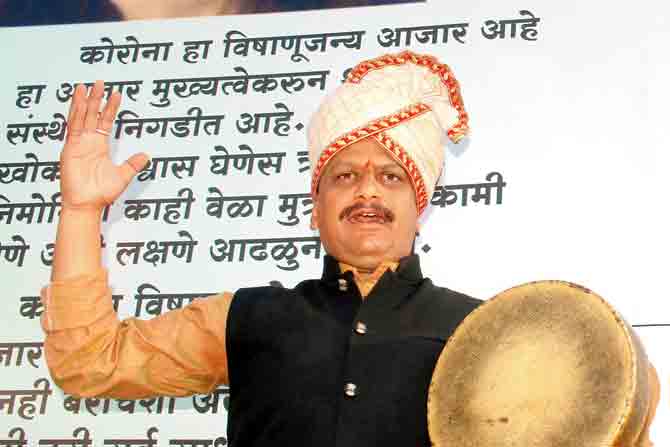Artistes across the country, confined to their homes, are using limericks, jingles, kirtan, shloka and folk poetry, to respond to the worldwide pandemic

Mumbai-based ventriloquist and puppeteer Satyajit Padhye, 36, has created a puppet named Mr Corona who is trying to overpower an innocent Mr Bunny, a common citizen, and brags about how he is trending worldwide. Pic/Sameer Markande
 Kolhapur-based poet-music teacher Dr Azad Papalal Nayakawadi, 39, is called a shahir (bard) on the move. When not teaching at the Usharaje High School, he is either facilitating medical help for patients from rural areas, or travelling India-wide to present his powadas or trademark folk ballad of Maharashtra to varied audiences. He has performed four times for the various Presidents of India. At this point, his city, like most areas in the state, operates under a curfew to combat the Coronavirus outbreak. A home-bound Dr Nayakawadi has, therefore, penned a powada asking people not to panic and follow hygiene guidelines. He has also busted some myths about the virus in his ballad: Daru cigarettene Corona marto moorkhancha upadesh/dhoop gaurya jala sangti, chukicha sandesh (Fools advocate liquor and cigarettes as antidotes to Corona/other ignorant souls say light dhoop and cowdung cakes). The powada advocates the use of sanitiser and soap; condemns habits like spitting and coughing without the use of masks.
Kolhapur-based poet-music teacher Dr Azad Papalal Nayakawadi, 39, is called a shahir (bard) on the move. When not teaching at the Usharaje High School, he is either facilitating medical help for patients from rural areas, or travelling India-wide to present his powadas or trademark folk ballad of Maharashtra to varied audiences. He has performed four times for the various Presidents of India. At this point, his city, like most areas in the state, operates under a curfew to combat the Coronavirus outbreak. A home-bound Dr Nayakawadi has, therefore, penned a powada asking people not to panic and follow hygiene guidelines. He has also busted some myths about the virus in his ballad: Daru cigarettene Corona marto moorkhancha upadesh/dhoop gaurya jala sangti, chukicha sandesh (Fools advocate liquor and cigarettes as antidotes to Corona/other ignorant souls say light dhoop and cowdung cakes). The powada advocates the use of sanitiser and soap; condemns habits like spitting and coughing without the use of masks.
Dr Nayakawadi started singing powadas at the age of seven; he has so far written 75, of which a sizeable number are premised on mass awareness themes like water conservation and climate control. But, his latest one on Coronavirus prevention has worked wonders on social media platforms. "I cannot move freely in these times, but my message can be amplified on cyberspace," says the bard, who has become a popular folk voice in the discourse around the virus across Maharashtra. "This is the least I can do—write and sing—when indoors," says Dr Nayakawadi, born to a Muslim father—also a shahir —and a Hindu mother. He says the outbreak has motivated his entire family, wife and children included, to devote their crowd pulling power for a cause.
ADVERTISEMENT
The virus has propelled many to use their indigenous forms of expression to add value to the ongoing social debate on public health. An Agri marriage composition, fast losing its clientele, called Dhavale, curses and threatens the virus to leave the country immediately. Similarly, Alandi-based Bhagwat Maharaj Salunke feels his kirtan form has a special place in current times. As a practising kirtankar who travels state-wide, and blogs his sojourns regularly, to recite Dyaneshwari and other texts, Maharaj has woven the Corona-centric message in his latest kirtan. He says his restricted mobility doesn't stop him from recording a five-minute rendering on the importance of washing hands repeatedly. Thankfully, Saint Tukaram or Muktabai, or most Indian saint poets have stressed enough on civic values, universal brotherhood and social peace, which helps Bhagwat Maharaj insert his modern-day communiqué. He feels bhajan-kirtan help in long-term healing required for society even after the 21-day lockdown.
 Kolhapur-based Shahir Dr Azad Papalal Nayakawadi sings a ballad promoting public hygiene against the backdrop of the pandemic. His powada on Coronavirus has been shared widely on conventional and new media
Kolhapur-based Shahir Dr Azad Papalal Nayakawadi sings a ballad promoting public hygiene against the backdrop of the pandemic. His powada on Coronavirus has been shared widely on conventional and new media
Mumbai-based ventriloquist and puppeteer Satyajit Padhye, 36, feels the best healing happens when people are made to chuckle amidst a crisis. Padhye has created a puppet named Mr Corona, who is trying to overpower an innocent Mr Bunny, a common citizen. In a funny repartee, aimed at underscoring the primacy of public hygiene, Padhye mounts a duel between the two characters. Mr Corona brags about how he is 'trending' worldwide; he is victoriously placed on door knobs and 'handles': whereas the common man is helpless. But soon, Bunny pulls out the hand wash and out goes the virus. A 'humanised' puppet tells the truth more forcefully than any other conventional tool, as is witnessed in the widely shared puppet video across audience segments. Padhye wants to further chase the puppet's trajectory.
Just as medicos cope with the virus on the field, jinglemakers, singers, satirists and skit writers are serving a niche role in creating awareness about the virus. A free exchange of Corona-related popular content, often penned by unidentified writers, across languages is enthusing in this context, especially because it has facilitated the healthy practice of translations. For instance, the Coronarakshakavacham, a Sanskrit rendering of a mantra for a protective shield against the virus, appeals to powerful deities to offer solace. A modified version of the mantra is available in Marathi too; an anonymous writer has, in fact, gone a step further in a play written in poetic meter, which dwells on the assembly of Hindu Gods and Goddesses. The deities feel relieved from human beings who have to sit at home and not flock to temples. A relaxed Lord Vithal goes in 'Vishram' position, Devi Rukmini changes into a soft cotton saree, eight Ashtavinayaka Ganpatis meet at leisure for the first time, Lord Krishna renounces his flute and feels at ease after ages. "Corona has given us some free time from humans, albeit for an unfortunate reason," the Gods unanimously declare. The skit is a wonderful oblique look at contemporary realities, shared, and commented on, liberally in the WhatsApp university.
The joke factory around work-from-home experiences has become the highlight of humour content around the outbreak. A harassed corporate worker has recorded the numerous onslaughts on his ears and eyes, even as he manages a morning zoom call. Rest-from-home and drink-from-home have become popular references to the changing workplace definitions. Hashtags like #madatkarona are aimed at husbands at home. Nasik-based Pushpa Gotkhindikar has in fact generated a funny verse pool around husbands-not-working-at-home. "Yeh karona, woh karona/tumbhi kuch kaam karona," urges her turn-of-phrase. Many women have joined her cyber attack on menfolk idling at home in the curfew situation. A new gender dynamic has emerged in the event of women's chores quadrupling because of the family-at-home scenario. It is reflecting in an online sisterhood where homemakers spell out lockdown dilemmas. One from Kalyan says: karonachya sathimulye kutumb ranglay khanyat; sahebanchya vastavyat jeev gela swaypakat, which translates to "Post the Corona outbreak, I am permanently posted in the kitchen, as Sir is stationed at home, eating all day long."

Alandi-based Bhagwat Maharaj Salunke incorporates the Coronavirus-prevention message in his kirtan; even when he can't travel, the kirtan is inboxed to followers across Maharashtra
Corona virus has also inspired Pune-based thespian Atul Pethe to create a series of one-minute videos titled, Theatre In The Time of Corona. The symbolic videos are open to interpretation; while some may see an unpeeling of a mask, others may find a disturbing reflection of the times. Pethe says no one can restrain his theatre craft in his choice of form, shape and duration. A classical singer from his city, Sandeep Ranade, has phrased a bandish composed in raag Basant around the virus outbreak. Suno mori baat na milao hath, ghar raho kuch din raat, urges the singer; asking the listener to stay at home and not shake hands. His composition was received positively across India. Similarly, the Jagrata sung by Rajasthani women has become popular asking Corona to leave India, not to forget our own Union Minister of State Ramdas Athawale's trademark, Go Corona Go chant.
For the first time in the history of Independent India have art practitioners been restricted to their homes for a record lockdown span. It is not surprising that they are finding novel idioms to express their emotions in the time of social distancing.
Sumedha Raikar-Mhatre is a culture columnist in search of the sub-text. You can reach her at sumedha.raikar@mid-day.com
Catch up on all the latest Mumbai news, crime news, current affairs, and also a complete guide on Mumbai from food to things to do and events across the city here. Also download the new mid-day Android and iOS apps to get latest updates
 Subscribe today by clicking the link and stay updated with the latest news!" Click here!
Subscribe today by clicking the link and stay updated with the latest news!" Click here!







